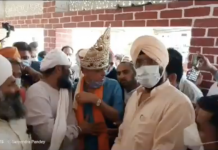

 KABUL, Afghanistan—A bill has been approved by Afghanistan President Ashraf Ghani’s cabinet that will allow reservation of a seat for Sikhs and Hindus in the country’s parliament. The bill was approved on September 18.
KABUL, Afghanistan—A bill has been approved by Afghanistan President Ashraf Ghani’s cabinet that will allow reservation of a seat for Sikhs and Hindus in the country’s parliament. The bill was approved on September 18.
Although at one time, there was a sizable Sikh population in the country, there are roughly 5,000 Sikhs left here. Due to increasing attacks by the Taliban and the ongoing conflict, Sikhs have been migrating out of Afghanistan.
Just in the past year alone, almost 75 families migrated out of the country. While most have now settled in India, some have made Pakistan their home. Sikhs and Hindus are Afghanistan’s only religious minority and are often put together in the general perception as Ahl-e Hunud.
While the bill has been approved by the cabinet, Sikhs in the country are not hopeful of a big change. Similar initiative was taken by the cabinet in 2013, however it was rejected by the lower house of the Afghan parliament on basis of legality and respect for country’s constitution. Article 22 of the Afghanistan constitution forbids any privilege or discrimination amongst Afghan citizens. 73 out of 130 MPs voted against the bill back then.
In 2013, MP Ahmad Behzad was a campaigner for a reserved Hindu-Sikh seat. Behzad held that it was responsibility of lawmakers to assist the nation’s minority groups. He stated that the current approach to not allow a reserved seat was hypocritical. He questioned why 10 seats were reserved for Kochis (nomads) and none for the Sikhs and Hindus.
The Shiromani Gurdwara Parbandhak Committee appreciated reservation of a seat for Sikhs and Hindus in the country. SGPC spokesperson Diljeet Singh from Sri Amritsar told Sikh24 that Afghan Sikhs were going through critical times and this bill has come as a relief to them. “This will allow Sikhs there to raise their issues directly in the parliament,” he added.
While a similar reservation is also available in Pakistan, there is no such provision for minority groups in India.




